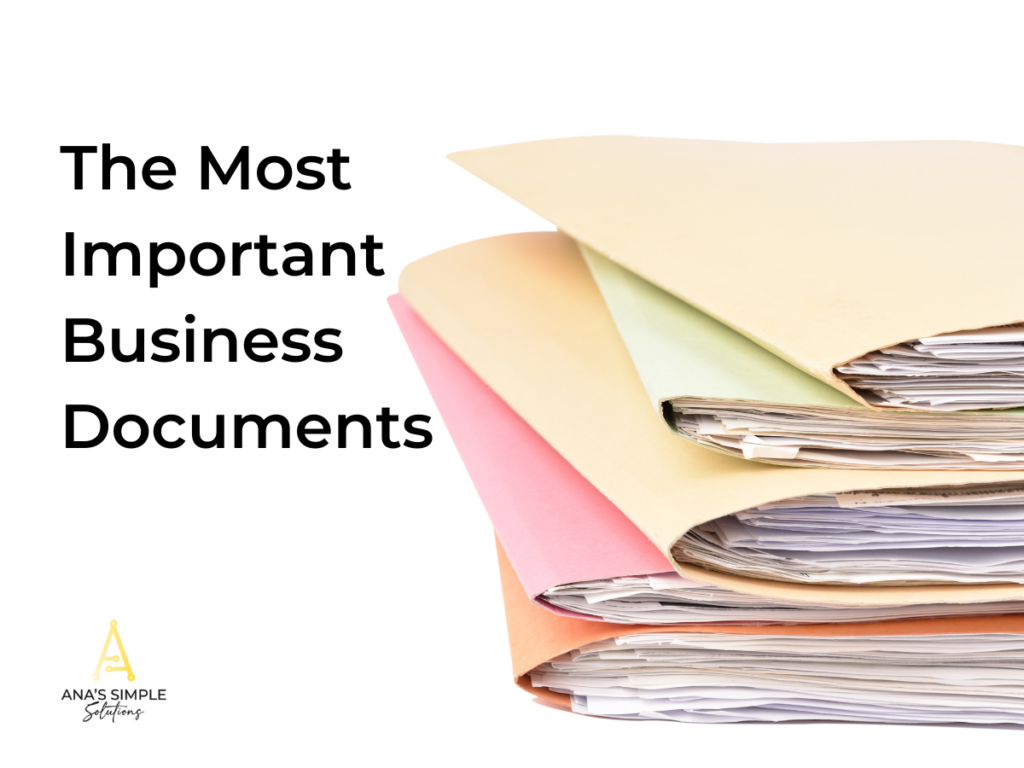
Business Documents Every Entrepreneur should have
Running a service-based business is all about outstanding experiences for your clients. But we know that behind the scenes, there is a bunch of important business documents, that play a crucial role in ensuring smooth operations. I’m sure I’m not that only one that find managing all of this “paperwork” can be overwhelming and time-consuming.
Nonetheless, organizing your business documents is vital for complying with legal requirements, simplifying decision-making, and enhancing operational effectiveness.
Well-organized documents improve team productivity, business profitability, and client satisfaction. These essential documents and how you organize them will determine how effective your communication is and how happy your stakeholders are.
Important Documents for Business Operations
Business operations documents not only help your business stay organized but also foster strong client relationships and ensure your clients receive top-notch service they can rave about. Here are some essential documents, with a personal touch, for smooth business operations.

- Business Reports: A thorough analysis of your company’s performance, including sales figures and financial reports, is crucial for making informed decisions and strategizing future plans. Make it a habit to update and review your business report regularly to stay on top of your company’s growth and pinpoint areas ripe for improvement.
- Bylaws: Company bylaws are like the friendly neighborhood guidelines that outline the rules and regulations governing your business operations. These documents keep your business on the straight and narrow, ensuring compliance with the law and adherence to established guidelines.
- Business Plan: A strategic roadmap for your business, detailing your aspirations, marketing strategies, and the wonderful potential customers waiting for you. A well-crafted business plan helps you make smart decisions and attract investors and partners eager to be part of your success story.
- Templates: Use templates for various documents, such as business letters, invoices, and memos, to maintain consistency and clarity. This practice ensures that your company maintains a professional image while also streamlining communication with clients and stakeholders. It’s like having a secret weapon for your business communication!
- Email: Use email for communication with your cherished team members, fresh new hires, and valued clients. Email is an efficient and cost-effective way to keep everyone informed and updated on company news, exciting announcements, and project progress.
- Case Studies: Share your success stories with potential new investors and stakeholders, showcasing your business’s capabilities. Case studies offer valuable insights into your company’s performance and spotlight your expertise in your field. It’s like giving them a front-row seat to your greatest hits!
- Non-Disclosure Agreement (NDA): A legally binding document that wraps your intellectual property and sensitive information in a warm, protective blanket. NDAs are essential for safeguarding trade secrets and maintaining a competitive edge in the market.
- Employment Agreement: A contract between you and your employees, outlining the terms and conditions of employment like a friendly handshake. Employment agreements help protect both parties’ interests and establish a clear understanding of expectations and responsibilities.
Documents for Client Management
Ah, client management! The lifeblood of any business and the source of both our joys and frustrations. To keep things running smoothly and ensure we’re all on the same page, there are some essential pages we need to have at the ready.
- Partnership Agreement: Think of this as the prenup of the business world. A legal document that outlines the ins and outs of your partnership, such as roles, responsibilities, and rights. It’s the perfect way to ensure that everyone’s playing by the same rules and helps prevent those pesky partnership squabbles.
- Personal Information: Spiderman learned the hard way, “with great power comes great responsibility.” Well, handling sensitive client information is no exception. Keep your clients’ data under lock and key, and be sure to comply with data protection regulations to avoid those dreaded legal complications and fines. No one wants to be “that business” in the headlines.
- Clear Advantages and Disadvantages: No one’s perfect, and neither are your products or services. Be upfront about potential drawbacks and offer solutions to tackle them. Clients appreciate honesty, and being transparent will only strengthen your bond (just like couples’ therapy, but for business).
- Business Letters: Ah, the art of crafting a good ol’ fashioned business letter. Ensure your letters are clear, concise, and strike the perfect tone to maintain a positive impression. Remember, you never get a second chance to make a first impression—unless you have a time machine, that is.
- Regulatory Documents: Nobody likes legal trouble. Keep your business on the straight and narrow by staying current with industry regulations and safety compliance standards. A little extra effort now will save you from a world of headache and costly mistakes down the road.
Documents for Financial Management
Financial management is a vital aspect of your business, and having the right documents in place can help you make informed decisions, streamline processes, and optimize resources.

- Invoices: Maintain a record of all invoices sent and received to track your business’s income and expenses. Regularly review your invoices to identify trends and areas for improvement.
- Business Insurance: Ensure that your company has the appropriate insurance coverage to protect against unforeseen events and minimize financial risks.
- Simple Language: Use clear and straightforward language when drafting financial documents to ensure that all stakeholders, including lenders, can understand your company’s financial position and performance.
- Bank Account Documents: Open a separate business bank account to manage your company’s finances and maintain a clear distinction between personal and business transactions.
- Financial Report: Prepare regular financial reports to analyze your business’s profitability, cash flow, and overall financial health. Use these reports to make informed decisions about investments, resource allocation, and growth strategies.
- Feasibility Studies: Conduct feasibility studies to assess the viability of new projects or business ventures. These studies help you determine whether a project is worth pursuing and identify potential risks and opportunities.
Organizing and Storing Your Documents
Get your business documents organized and under control – trust me, it’s a game-changer! While I could write a whole series on this topic, I can’t help but mention some vital tips here.
You’ll find some digital organization tips for your documents that will help you take control and tame that paper chaos.
- Be specific and categorize: Use clear, concise labels, color-coding, or other organizing methods to make finding documents a breeze. I’ve got all my documents all organized in specific folders on Google Drive, with a “hub” in Airtable, categorized by type.
Check out my video on my Executive Hub. - Group similar documents: Keep similar documents together to save time and reduce the chance of misplacing essential info. Client documents get put in client folders, financial documents nestle in the financial folder, product descriptions in the product development folder… you get the idea!
- Go digital: Embrace cloud-based storage options like Google Drive or Dropbox for easy accessibility and security. It’s 2023, after all! While I’m a die-hard fan of physical notebooks for brainstorming and learning, I also appreciate the value of digital document management. It not only saves space but also gives your team easy access to what they need without constantly bugging you.
- Back it up: Protect your hard work against data loss or theft by having backup copies of all crucial documents. Do a purge: Make it a habit to review and toss any outdated or unnecessary documents regularly. Keep what you genuinely need, and keep it organized. I know it sounds like I’m channeling my inner corporate guru, but it’s true. Backing up your documents, especially the important ones, is essential in our digital world. I use Google Drive and have it set up to sync with my desktop. This way, I can create copies on my hard drive (external or internal) of all my vital documents.
Check out my YouTube videos and my specific one below for how to use Google Drive-stream on your desktop, making accessing files super-simple and quick!
Organizing and managing your documents might seem like a daunting task, but it is crucial for maintaining compliance, streamlining decision-making, and enhancing operational efficiency. By categorizing documents, maintaining clear communication with clients and stakeholders, and using digital storage solutions, you can ensure that your business remains organized and prepared for success.
Remember to periodically review your documents, update them as needed, and back up your data to protect your business. With well-organized documents, you can focus on delivering exceptional experiences for your clients, growing your business, and enjoying the rewards of your hard work.
FAQ’s
What types of documents do I need to start a business?
You will need to create a business plan, register your business with the appropriate government agencies, obtain any necessary licenses and permits, and draft legal documents such as partnership agreements or articles of incorporation.
What financial documents do I need to keep track of for tax purposes?
For tax purposes, service-based entrepreneurs need to keep track of important financial documents such as income statements, balance sheets, and tax returns. Other documents to keep track of include invoices, receipts, and bank statements.
What legal documents do I need to have in place to protect my business?
To protect your business legally, you may need to create contracts, agreements, and policies. Examples of legal documents include client agreements, employee contracts, and privacy policies.
How often should I review and update my documents?
It’s a good practice to review and update your documents on a regular basis, such as annually. This will help ensure that your documents are up-to-date with any changes in your business or industry.
How do I ensure that my documents are compliant with relevant laws and regulations?
You can consult with legal professionals or seek out industry-specific guidelines to help ensure compliance. While most of my documents live in Google Drive within pre-defined folders, I have them all linked together in my Executive or Team Hub in Airtable where I can quickly find whatever I am looking for with a search or by creating a quick view for those categorized as Documents.



